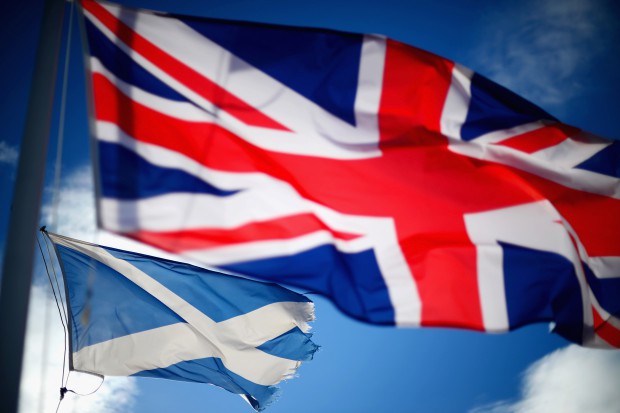Hugo Rifkind had an interesting piece in the Times yesterday on the Scottish referendum arguing that the No campaign, by focussing on economics and pragmatism (where they obviously have the edge), had totally conceded the realm of emotion and attachment. Yet Rifkind, coming south in his twenties to settle in London, had found that England was his home, too, and ends his article explaining why Britain is indeed one country.
The whole No campaign seems devoid of any idea of British patriotism, indeed barely mentions the B-word in its literature, instead approaching the thing like an unhappy spouse weighing up the costs of sticking with it or leaving to end up poorer. If that’s the reason for union, then it’s not one that’s going to keep the marriage going for very long; and indeed opinion polls show a huge gulf between the over-sixties and the rest of the Scottish population, which suggests that whatever the result this month, independence will come eventually.
And in the south many of those advocating the United Kingdom sound remarkably like they could be making the case for the European Union, using arguments for pooling resources to create a social democracy. JK Rowling’s version of British patriotism may have angered some of the SNP’s weirder supporters, but it would leave many Englishmen cold. Likewise with Eddie Izzard or Tony Robinson: the cheerleaders for union are mainly coming from the soft Left, the very people who least empathise with patriotism or understand the things that hold people together – history, mythology and hormones. The union was built on Protestantism, war and empire, ideas that the Left feels uncomfortable with, and no one has really come up with replacement reasons for its existence. (The most compelling patriotic case for union was made by the maverick George Galloway.)
In contrast, English patriotism is fairly strong, if proletarianised, and motivated partly by a sense of resentment over immigration, which is of far more concern to people than what happens beyond the Wall of Ice. If you’re from London or Birmingham and seen your country changed beyond recognition, whether it’s the Union Flag or St George’s Cross flying from the local council building makes little difference. South of the border, people have tended to see English and British as psychologically interchangeable anyway.
The good news for Scots unionists is that independence probably won’t make much difference to them either, if Ireland’s example is anything to go by. Ireland’s break from England was far more bitter – but today a majority of Brits don’t regard the Irish as foreigners and in every legal way the Irish are de facto British citizens, and an Irish accent is no impediment to almost any position in British society, except perhaps the Cabinet. What’s more, now that the countries are separate legal entities, Anglo-Irish relations have never been warmer. The Scots aren’t going to become foreigners just because of a vote.







Comments